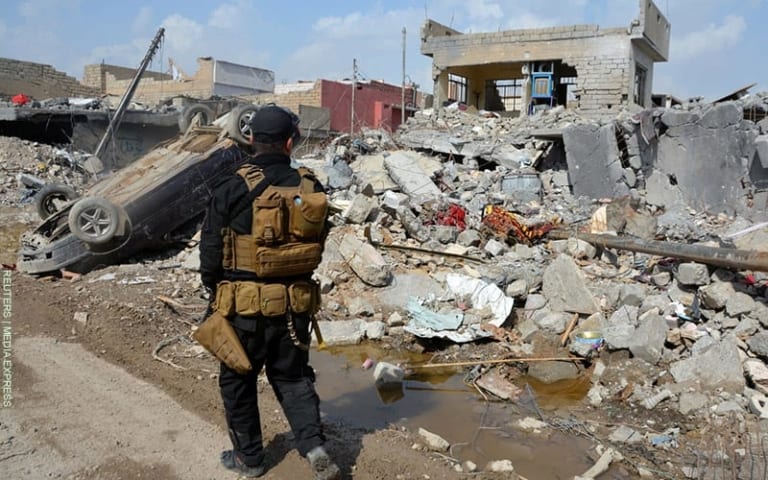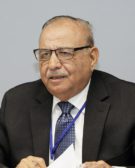
There have been widespread allegations that the destruction of Mosul, the major Sunni Iraqi city after Baghdad, is the aim of the Iranian-backed Shiite militias, the Popular Mobilization Forces (PMF). This has happened before and proven to be true in Ramadi, Falluja, Tikrit, and other major Sunni Arab cities and towns, and even the Sunni countryside, as well as in the Sunni belt of Baghdad and Maqdadiya in the Diyala governorate.
In a recent case, the US Air Force targeted a civilian area, which was a tragic occurrence. Iraq’s Sunni Arab population had been expecting changes from the new American administration. Instead American air power was used once again to perhaps give another party in Iraq the upper hand to decide the future of the country and of the vast, highly populated Sunni Arab region, which begins 45 miles south of Baghdad (known as Jurf Al-Sakhar) up to the northernmost point west of the Tigris on the Iraq-Syria-Turkey border.
The most embarrassing aspect of the American air strike over civilian quarters in Mosul is that the event came only two days after the return of Haider al-Abadi, the Iraqi prime minister, from his US trip, where he met with President Trump and top officials of the new American administration. Iraqis recall a similar visit to Washington in 2011 by the then-prime minister of Iraq, Nouri al-Maliki, which ended with the targeting of Sunni Arabs, beginning with the former Vice President Tariq al-Al-Hashimi, the most senior Sunni Arab figure in the Iraqi government. This led to the curbing of peaceful Sunni demonstrations and sit-ins in the Iraqi cities of Hawija, Mosul, and Ramadi. The major outcome of this repression has been that ISIL secured the chance to gain control over about two-thirds of Iraq using a large quantity of arms and ammunitions, an act that some observers described as conspiratorial on the part of al-Maliki.
For Iran and its Iraqi adherents, the destruction of the Sunni cities is the primary priority in Iran’s initiative to advance its project in the Arab Middle East, which aims to gain control of the territories east of the Pamir Mountains south to the Mediterranean. In this context, the Sunni areas in Iraq and Syria are most vital; however, they cannot be controlled unless they are destroyed, a circumstance that will force local inhabitants to seek refugee elsewhere. This is not an exaggeration; the same strategy was used in all the other Sunni majority cities and towns, not only in Iraq, but also in Syria: Aleppo, Hama, Homs, and the belts of both Baghdad and Damascus.
On March 23, 2017, an air raid carried out by the US Air Force, as part of its commitment to the Global Coalition to Counter ISIS, responded to an Iraqi request to hit a particular location in western Mosul under the pretext that it hosted a major Islamic State in Iraq and the Levant (ISIL) force. The results were shocking: hundreds of civilians—including the elderly, women, children, and infants—lost their lives under debris because of the poorly planned air strike.
Military combat instructions and staff guidelines dictate that an air strike request by ground forces should not be authorized until it has been duly studied, analyzed, and given priority. Responding to the Iraqi request on an expedited response basis purely because ISIL is the purported target, without making sure that civilians will not be harmed, even minimally, makes the US Air Force guilty of targeting civilians in a combat area, an action contrary to the coalition’s aims.
The Iraqi military first denied that such a strike happened, later blaming ISIL for the civilian deaths. Affected civilians in Mosul themselves questioned the air raids. Prime Minister Haider al-Abadi gave several statements defending his armed forces and concluding that certain circles exaggerated the issue to distract attention from the liberation operation, and this resulted in giving ISIL some time to breathe.
The American generals first said that they acted on a request by the Iraqi Field Command, whose operation required dealing with the target as a place where ISIL personnel were concentrated. Al-Abadi said, “Increasing allegations of targeting civilians are aimed at saving Daesh (Islamic State) in their final moments and to halt international support for Iraq in its war against terrorism.” He gave this statement in a meeting with the media and political analysts, adding, “We trust our forces and their commitments to protect civilians”—without mentioning the 200 or so civilian victims killed in the air strike requested by his field forces and executed by the US Air Force.
The coalition said that it was investigating the air strike, while an Iraqi general commander of the operation claimed that there is no evidence that the civilians were victims of the air strike, and, in a show of hypocrisy, accused ISIL of fabricating these allegations to defame the victorious battle fought by Iraqi forces. At the same time, US Lieutenant General Stephen Townsend stated that the civilians may have been victims of explosives placed by ISIL in the building as a precautionary measure, but said afterward that there is a “fair chance” that the air strike, led by the coalition, resulted in civilian deaths as collateral damage of war.
It would behoove the American field commander to analyze this air raid more attentively and, in the future, he should be more selective the next time the Iraqis request an air strike. The objective should be analyzed in the best ways available to the air force staff. It should also take into consideration that some Iranian-supported militias may want to render Mosul unlivable and keep the majority of its population of two million inhabitants displaced and seeking refuge. Since this has occurred before in all the Sunni cities of Iraq, with documentation by the Americans, it is clear that attributing such an inhuman action to incidental acts of war is not only unjust but hypocritical.
In the US Congress, the issue of civilian casualties of the US strike took another course. Representative Ted Lieu (D-California) demanded answers from Secretary of Defense James Mattis. “The American public deserves to know what is going on in Syria and Iraq,” Lieu wrote in a four-page letter to Mattis on March 30, 2017, and listed 19 questions for the secretary. “The apparently large numbers of children and civilian adults being killed by U.S. forces is not acceptable.” Secretary Mattis responded by saying that, “There is no military force in the world that has proven more sensitive to civilian casualties. We are keenly aware that every battlefield where an enemy hides behind women and children is also a humanitarian field, and we go out of our way to always do everything humanly possible to reduce the loss of life or injury among innocent people.”
To be sure, this does not justify the massacre. The problem was that there was no real and systematic target analysis—had this been done, the target would have easily revealed the area as a civilian location. According to US ethics and rules of engagement, the strike would not have been justified, even if ISIL fighters were in the vicinity. The incident gave both ISIL and Al-Qaeda the opening to present themselves as defenders of the victims; they posted pictures of the destroyed civilian homes and a medical center with a statement: “This is how Trump is liberating Mosul, by killing its inhabitants.”
A lot was lost in the trust factor. Iraq’s Sunnis were looking forward to new constructive and practical relations with the US forces, and the United States at large, including lobbying for their legitimate rights as Iraqi citizens seeking to live in their country in peace together with their compatriots. They had lost those rights since the Shiite parties and militias took control over Iraq and its destiny; they had been dreaming of ways to curb Iran’s intervention and meddling in Iraqi affairs. None of that materialized—on the contrary, more killings and civilian casualties have been the outcome of the current “Mosul Liberation” operation. Indeed, according to the 2008 Strategic Framework Agreement signed between Baghdad and Washington, the United States is supposed to be dedicated to helping Iraq improve security, maintain sovereignty, and defeat ISIL and other terrorist groups sponsored by Iran.
Extending military assistance to the Iraqi Armed forces both in training and equipment aims to create a modern and professional Iraqi military capable of defending Iraq and its borders. Time has proved that, until now, this goal has not been attained. The Iraqi military still requires more time and training to assume, on a more profound level, the military values and responsibilities toward its people, advancing to become an accountable and disciplined institution that will guarantee the continuity of US military aid. Article 9 of Iraq’s constitution forbids the military to suppress the Iraqi people, or to form a military militia or organization outside the legitimate military establishment. These two constitutional precepts have not been respected by the current government. It is imperative that the US government ascertain to the Iraqi government, within the spirit of partnership and strategic cooperation, that it is not only ISIL that is the enemy of the Iraqi people, and that the Iranian-sponsored militias present a threat that is just as pernicious.
Further, Prime Minister al-Abadi should be encouraged to part with his sectarian history, and the sectarian party to which he belongs, because the establishment of political entities on religious, racial, and sectarian bases will only ensure the continuation of the biased nature of the political process in the country. Reaching out to all segments of the Iraqi society will ensure the neutrality of the government and assist in the establishment of the rule of law.
The recent tragic events in Mosul need to be addressed, and the lessons learned should be applied to future activities to ensure the safe conduct of the Iraqi military, the dignity and prosperity of Iraqi citizens, and the genuine and widespread application of the rule of law in Iraq.

